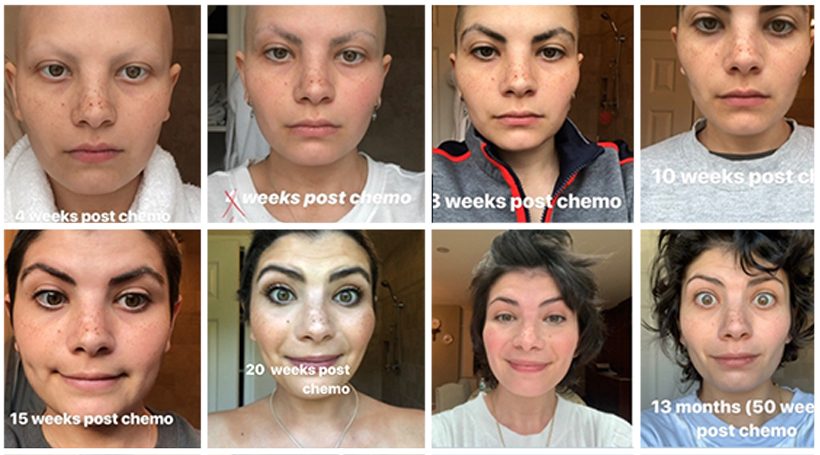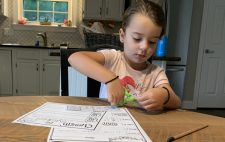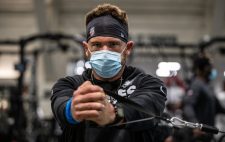Alex George is instantly likeable. She’s funny and chatty, the kind of person you can hear smiling through the phone. She’s self-assured, and has a way with words that makes her seem older than just 24. But then, she’s been through a lot.

In the last 3 years, the Moorestown native finished college, got an on-air news job, was diagnosed with cancer (and quit her job), fought for her life, won, and went back to work, this time at her dream job at FOX 29, the station that inspired her to pursue a TV news career. As she celebrates being officially cancer-free for more than a year, George seems to be wrapping both arms around all the good news she can find, and that kind of positivity is contagious.
After finishing college in Michigan, George moved to Chattanooga, Tenn., where her career was taking off. But just 10 months into the job, she began experiencing a bothersome pain in her shoulder. The marathoner and gym-goer thought it might be a workout-related injury, but it kept getting worse, and doctors couldn’t explain why.
“I was misdiagnosed about 4 times,” George says. “I was 22, going to these appointments all by myself, and I didn’t have any idea it could be serious. It doesn’t feel like the stakes are that high until they send you from a dermatologist to an oncologist.”
Finally, an oncologist took a closer look at some pathology. “He only recognized it because he’d seen it once before, on a rotation in pediatric oncology he did 25 years ago,” George says.
She was diagnosed with a form of Ewing’s sarcoma, a rare bone cancer. With aggressive treatment, the doctor gave her a 60 to 70% chance of survival. He suggested she go home to South Jersey and start chemotherapy immediately.
“He said, ‘You’ll want to be with your family.’ He never could’ve really prepared me, but he said this chemo was going to be really, really, really rough,” she recalls. “That was no lie.”
Almost immediately, George started on a punishing schedule of treatments.
“My brain was mush. I couldn’t swallow,” she says. “I had everything from blurry vision to ringing ears – every single symptom in the book.”
The side effects left her hospitalized for the better part of 8 months. After each round of chemo, she says, she’d get to go home for a week or so before almost assuredly needing to return to the hospital.
“I kept spiking neutropenic fevers,” she says. “Your body believes it’s being attacked from the inside. But anytime you spike a fever as a cancer patient in chemo, they have to bring you in and make sure you don’t have an infection.”
It was months of misery, but George is fantastically – almost combatively – optimistic. Her family could still do things like watch movies or have game night, where George would play the “cancer card.”
“If I was losing, I’d just go, ‘Ahhh, my cancer!’ and they’d let me win,” she laughs. “If you can convince someone else it’ll be ok, you get through the day.”
When she recalls the intense physical agony, and her reckoning with life and death, George shows little emotion. But when remembering her family’s support, comfort and inside jokes, she starts to cry.
“My family was really good at laughing with me and making moments that could’ve been the darkest, feel brighter and better,” she says. “And even when you think you don’t have a lot of time left, if you’re surrounded by people who love you and who you love, you can enjoy every moment. Life is funnier, and you don’t take things as seriously.”
Though she wasn’t working through most of it, she had to reckon with the way chemotherapy ravaged her appearance.
“When all the hair falls off, you don’t look like you,” she says. “You really see all your features and you think, wow, is this what I’ve always looked like? It was hard to connect that person in the mirror to the person I used to be. My personality was there, even though it was clouded by the chemo drugs. But I looked at myself in the mirror and that felt so foreign.”
George found ways to make even baldness funny. “I dressed up as Pitbull and Charlie Brown,” she says. On social media, she documented and shared the journey through hair loss and regrowth. She wanted to help other people facing chemo know what to expect, but it was also about getting to know the new her.
“So much of being in the TV news industry is physical,” she says. “You come to know what you look like because you have to constantly watch yourself – that’s how you get better at your job. I was so used to seeing this one version of myself, and then it was gone. I don’t think that person will ever really come back, physically or mentally.”
George is now back on the air, but the road to recovery is long.
“It’s taken me about 9 months to be able to run a mile,” she says. “I used to be a marathoner. It took me all that time to get up to 1/26th of what I could do before.”
George’s last chemo treatment was over a year ago, and she remains cancer-free. It was an experience she hopes to never, ever repeat, but she feels it bolstered her ability to seek things that bring her joy and let everything else just roll off her back.
“It was a whole lifetime compressed into 9 months,” she says. “You should like your life, being alive is such a privilege.”














